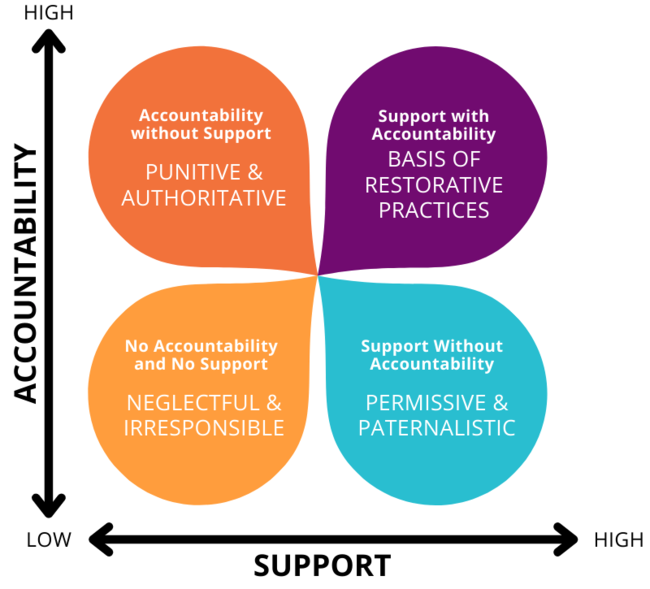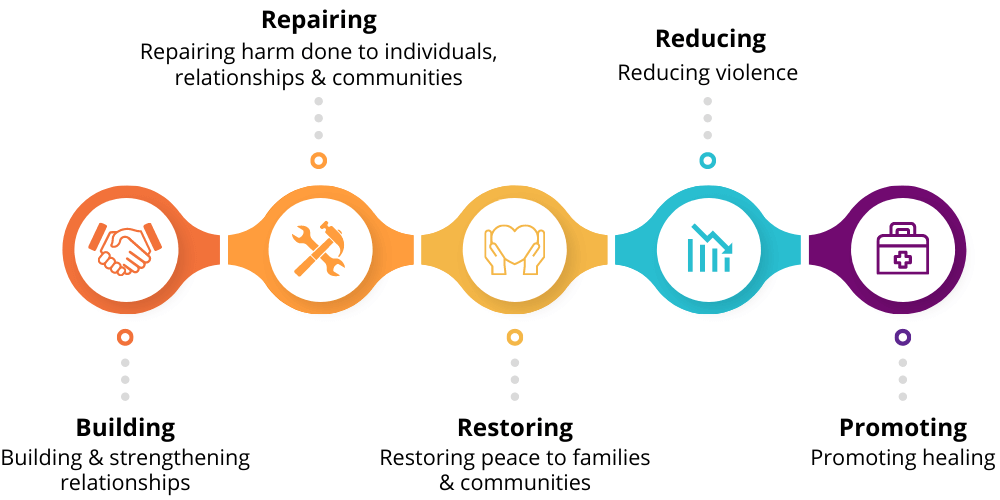About the Transformative Justice Committee

The Transformative Justice Committee (TJC) was established in 2020 to help VFP develop a more just and equitable process of accountability. Since then, the TJC has been building our knowledge about TJ practices and has conducted workshops and listening sessions with members - most recently during our 2021 VFP Convention.
Veterans For Peace is also committed to Diversity, Equity, and Inclusion (DEI). In 2021 the Board of Directors approved a DEI audit of the organization to ensure that our community is a strengths empowering organization where all Veterans who believe in peace and social justice are welcomed. This process is still ongoing and we will be providing updates.
What are the benefits of restorative practices?
Restorative practices have many benefits—to individuals, to communities, and to our world:

What does the Restorative Justice Process and Circle look like for VFP?
On the surface, restorative practices work in a very simple way: by bringing people together to talk and to share their stories. Before conflicts arise or harm is done, restorative practices make it possible for people to build relationships.
The sense of community this interaction creates helps to prevent problems—and makes it easier to resolve them if they do occur. It is extremely important to emphasize that the restorative justice process is completely voluntary and emphasizes empathy and compassion for all who participate.
After an instance of harm is presented, the TJC will reach out to individuals who are impacted and see if they are willing to participate in the process. If enough people are willing to participate, a Zoom or hybrid circle will be scheduled. The circle will provide a safe place for everyone to feel heard, the harm to be recognized, people's experiences to be validated, and decide steps to heal the harm. This process will be as confidential as possible, respecting the privacy of all participants and will be closed to those not directly impacted by the events.
Community Building Circles
One of the methods used by restorative practices are community building circles. This is a process of bringing people together, giving equal opportunities to share stories, experiences, hopes, and concerns. This can be both a vulnerable and rewarding process; allowing people to feel heard and validated in their experiences.
These circles are led by a facilitator who designs questions that are answered by all participants without interruption while participants actively listen to each other.
By creating a process that is voluntary—and by using methods that reduce anxieties for all participants—restorative practices work in situations that might otherwise be out of reach.
Restorative practices are proven tools for helping people to listen, to talk—and to understand.
Confidentiality and Privacy
All information shared with the Transformative Justice Committee will be treated as confidential, including the fact that the person reached out to us, and will not be shared externally to the committee without permission.
This confidentiality agreement will extend to any restorative justice based gathering(s), such as a community circle, with information being shared staying within the circle gathered - unless permission is granted to share information (e.g., for a community statement on lessons learned).
Exception: The Board of Directors is obliged by our bylaws to divulge the names of members removed from the organization during the next annual meeting. In this circumstance, the Board of Directors is only obligated to divulge the name of the person expelled and not the name of the person(s) raising the original complaint(s) that led to the expulsion.
Steps to Mitigate Punitive Actions
- Meeting 1-on-1 with a TJC Champion;
- Requesting education and/or therapeutic participation;
- Asking individuals to take a voluntary period of time off from VFP for a cooling off period;
- Refer the individual to the Board of Directors for next steps with notification to member regarding risk of suspension or expulsion if unwilling to step back and commit to TJ work;
- Member Suspension*: Requiring individuals to take a mandatory period of time off from VFP to work on themselves so that they can re-enter the organization in a healthier position;
- Member Expulsion*: If the above interventions are unsuccessful, that individual will be expelled from the organization.
*The Board of Directors are allowed to suspend or expel members who act in a manner that is harmful and/or unbecoming the organization, per our Bylaws. These steps will be taken as an intervention of last resort, barring instances so extreme that they are not appropriate for TJC processes.

